Book of Marvels
Wednesday, August 30, 2006
Office Geography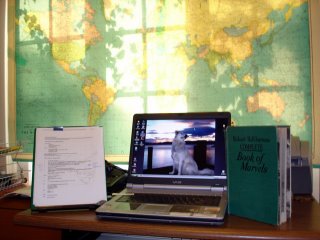
"Of course I remember that map!" my mother said. "I put it up on the kitchen wall and everyone laughed at me, but we must have looked at it ten times a day."
I'm sure it must have been our mean old neighbor--who accused me of twisting the head off a baby bird!-- who laughed at her, not everyone.
Last time I was home, I was looking at the top of the closet of my old room, wondering what might be left of me there. Not much. The map was on a shelf at the back of the closet, covered with dust and torn nearly in half. I'm not sure what year it was published, but it was hanging in our kitchen in either the late 50s or the early 60s.
I'd been wanting to change things in my office. I wrote an article a while ago about a designer who uses feng sui to make corporate offices more congenial. I was tempted to have her feng sui my office at home, but figured she'd tell me some things to do and I'd never do them and it would be yet another thing I'd wasted money on. But inspired by her, I went home and threw away my weight in magazines and papers and reorganized my shelves so that I could actually find things. I didn't want to disrupt my life enough to paint--even though she told me, "No one should have white walls!"--but I imagined painting them a sort of watery green. Then I realized that the map would fit quite perfectly over the window behind my desk. My husband taped it together, and we hung it with bread ties (or something like bread ties ).
Isn't it lovely? This picture was taken in late afternoon with the sun slanting in from the west, making the map look like stained glass. Behind it, you can see the window of many mullions that has made so many painters groan, also the vine that is slowly covering that side of the house and making the issue of painters moot. Now I know that the color I wanted for my office walls is the green of Afghanistan, Turkey, and Romania-- not the somewhat more garish green of India, Finland, and all of the United States.
When I'm groping for words, I stare at the world gone by-- that big yellow Soviet Union, the smaller fatalities of Zaire and Yugoslavia, also yellow, and pink extinct Rhodesia. It's quite possible that I'm learning all the wrong geography. I find myself saying, "Oh, that's where XXX is"-- then wondering if it too hasn't changed into something else.
On the right is the real Book of Marvels, still with me after all these years. On the left is my daily to-do list, not quite done.

"Of course I remember that map!" my mother said. "I put it up on the kitchen wall and everyone laughed at me, but we must have looked at it ten times a day."
I'm sure it must have been our mean old neighbor--who accused me of twisting the head off a baby bird!-- who laughed at her, not everyone.
Last time I was home, I was looking at the top of the closet of my old room, wondering what might be left of me there. Not much. The map was on a shelf at the back of the closet, covered with dust and torn nearly in half. I'm not sure what year it was published, but it was hanging in our kitchen in either the late 50s or the early 60s.
I'd been wanting to change things in my office. I wrote an article a while ago about a designer who uses feng sui to make corporate offices more congenial. I was tempted to have her feng sui my office at home, but figured she'd tell me some things to do and I'd never do them and it would be yet another thing I'd wasted money on. But inspired by her, I went home and threw away my weight in magazines and papers and reorganized my shelves so that I could actually find things. I didn't want to disrupt my life enough to paint--even though she told me, "No one should have white walls!"--but I imagined painting them a sort of watery green. Then I realized that the map would fit quite perfectly over the window behind my desk. My husband taped it together, and we hung it with bread ties (or something like bread ties ).
Isn't it lovely? This picture was taken in late afternoon with the sun slanting in from the west, making the map look like stained glass. Behind it, you can see the window of many mullions that has made so many painters groan, also the vine that is slowly covering that side of the house and making the issue of painters moot. Now I know that the color I wanted for my office walls is the green of Afghanistan, Turkey, and Romania-- not the somewhat more garish green of India, Finland, and all of the United States.
When I'm groping for words, I stare at the world gone by-- that big yellow Soviet Union, the smaller fatalities of Zaire and Yugoslavia, also yellow, and pink extinct Rhodesia. It's quite possible that I'm learning all the wrong geography. I find myself saying, "Oh, that's where XXX is"-- then wondering if it too hasn't changed into something else.
On the right is the real Book of Marvels, still with me after all these years. On the left is my daily to-do list, not quite done.

Wednesday, August 23, 2006
The Bee is Back?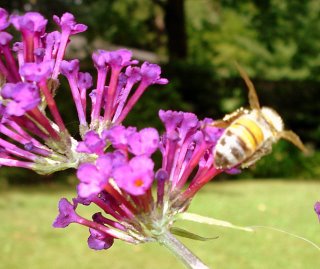
I swore to friends earlier this summer that I had seen honeybees in my garden. Excitement all around!
When someone told me several years ago that both wild and commercial bees were dying out because of pesticide overuse and a mite infestation, I was distraught. That's the kind of news that puts me in an apolcalyptic state of mind, where I'm afraid that all the things I love about the world are disappearing. Every time I'd see something buzzing around my flowers, I'd crouch nearby and try to see if it was a real, true honeybee. Most of the time, it seemed not quite right-- too small or too large, too dark, too swift, missing that pleasant, unhurried, highly heedful dithering that I associate with honeybees.
I'm not completely sure this is a honeybee, either-- I emailed a picture to a bee expert but have not heard back. The body seems to lack the golden fuzziness that I recall from the honeybees of my youth. He could be one of the 4,000 species of wild bees in this country. You can't see it in this picture, but he is carrying plump saddlebags of pollen-- that seems to be a hopeful sign of a creature that intends to make an overabundance of honey.
I have to be careful of the bees--honey, bumble and otherwise--because there is so much work after an absence of six weeks. So much weeding! Nature abhors a vacuum and nowhere so much as in my garden, where I diligently tore out all the stupid violets before I left. I returned to find that annoyingly robust self-seeders had taken over the territory. But weeding and dead-heading is hazardous when the bees are still so very busy among my phlox, buddleia, joe-pye, monarda, gloriosa daisies, lythrum and asters. I always assume that the bees see me as a partner, out there to ensure yet more flowering of all that they seek. But, there are some bumblebees out there nearly as big as my fist. I feel they are looking at me balefully.
Some people feel like God in their gardens, making all those important decisions about what lives and what must depart, keeping bloom and foliage and variety in balance. But I'm a very bad god. I oafishly step on one plant when I'm reaching for another, tear things out in the spring because I can't remember that I planted them in the fall, and get tired in the middle of the summer and let the Japanese anemones take over. And I feel slightly guilty when I'm deadheading, especially at this time of year. My poor plants have already worked hard, putting out one burst of bloom after another. The evidence of their fecundity is drying at the end of a stem, but that's what I must snip away to encourage yet more bloom. Isn't this like a greedy audience at the end of a performer's fourth encore, demanding more? More!

I swore to friends earlier this summer that I had seen honeybees in my garden. Excitement all around!
When someone told me several years ago that both wild and commercial bees were dying out because of pesticide overuse and a mite infestation, I was distraught. That's the kind of news that puts me in an apolcalyptic state of mind, where I'm afraid that all the things I love about the world are disappearing. Every time I'd see something buzzing around my flowers, I'd crouch nearby and try to see if it was a real, true honeybee. Most of the time, it seemed not quite right-- too small or too large, too dark, too swift, missing that pleasant, unhurried, highly heedful dithering that I associate with honeybees.
I'm not completely sure this is a honeybee, either-- I emailed a picture to a bee expert but have not heard back. The body seems to lack the golden fuzziness that I recall from the honeybees of my youth. He could be one of the 4,000 species of wild bees in this country. You can't see it in this picture, but he is carrying plump saddlebags of pollen-- that seems to be a hopeful sign of a creature that intends to make an overabundance of honey.
I have to be careful of the bees--honey, bumble and otherwise--because there is so much work after an absence of six weeks. So much weeding! Nature abhors a vacuum and nowhere so much as in my garden, where I diligently tore out all the stupid violets before I left. I returned to find that annoyingly robust self-seeders had taken over the territory. But weeding and dead-heading is hazardous when the bees are still so very busy among my phlox, buddleia, joe-pye, monarda, gloriosa daisies, lythrum and asters. I always assume that the bees see me as a partner, out there to ensure yet more flowering of all that they seek. But, there are some bumblebees out there nearly as big as my fist. I feel they are looking at me balefully.
Some people feel like God in their gardens, making all those important decisions about what lives and what must depart, keeping bloom and foliage and variety in balance. But I'm a very bad god. I oafishly step on one plant when I'm reaching for another, tear things out in the spring because I can't remember that I planted them in the fall, and get tired in the middle of the summer and let the Japanese anemones take over. And I feel slightly guilty when I'm deadheading, especially at this time of year. My poor plants have already worked hard, putting out one burst of bloom after another. The evidence of their fecundity is drying at the end of a stem, but that's what I must snip away to encourage yet more bloom. Isn't this like a greedy audience at the end of a performer's fourth encore, demanding more? More!

Monday, August 14, 2006
 Horse Heaven
Horse HeavenI'm working on an article for Wildlife Conservation about the Black Hills Wild Horse Sanctuary, rummaging through the 250 pictures my husband and I shot to remind me of how wonderful it was to be there. We spent three days in South Dakota in late June-- really, I could have spent three weeks wandering that state. You can drive down what seems like an ordinary road there and wind up falling over in awe.
Half our time was spent at the horse sanctuary, where 500 wild horses that have been removed from public lands are living the good life on open range near Hell Canyon. And I was living the good life along with them! As we were driving around with the sanctuary's director, I was thinking how wonderful it is to be a freelance writer-- to come up with a great idea for an article (okay, I think all my ideas are great), to get an editor to agree, then to walk though the door into that other world that each article represents. Plenty of tourists visit the sanctuary, but when you're there to write about it you have this incredibly dense, rich experience with the place and the people that no one else gets. I've been carrying that experience around with me for the past month, as if it's a hard little seed. Now to see what I can grow from it.
The sanctuary sells foals--here's one from this year's fecundity. Look at the heart on his face! As if his genes held a little conference before he was born: "How do we make this guy extra cute?"

Sunday, August 13, 2006
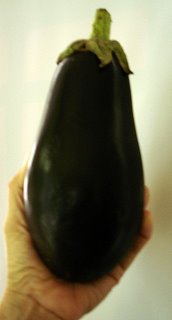 My thoughts turn to eggplant
My thoughts turn to eggplantMy friend Lucette has been asking me for my mother's eggplant recipe, which I served her two weeks ago and will serve her yet again in a few days.
Who wouldn't think of eggplant these days? The farmers market is full of them: long graceful lavender ones, round ones that look like they're wrapped in purple ribbons, and of course the ebony beauties on the right. I love everything to do with eggplant. I love picking out the shiniest best of pile at the market. Washing them, watching the water bead on their skin, admiring the way they mirror the room as they dry. Slicing into the white flesh. I have one recipe that calls for salting the slices, laying them out on towels, and sweating out the water. I always feel as if I'm ministering to delicate creatures--sponging away their beads of sweat, turning them over to watch the dew rise on their other sides, sponging again. Well--then cooking and eating them.
My mother always grew all her own eggplants. When we lived in Oroville--very small town California--she had a huge garden where she grew just about every vegetable I'd ever heard of. I'm not sure if she was all-organic then--I think she would have scoffed at this as an ill-conceived notion, since she had gardened through the depression and figured that anything that increased yield had to be good. But because of that same depression experience, she couldn't stand to waste anything. Thus every scrap of leftover went to her compost bins, which she tended as diligently as she tended her children. She lives in an apartment now and has no compost bin. Still, she gasps when someone throws away so much as a teabag! We were trained to snip off the string and tag and the staple that held them, and put the rest of the teabag into the container under the sink that held the compost materials.
I've been looking for the cookbook where my mother's recipe first appeared. It was in an old Omega Nu cookbook from Oroville--maybe from the 60s or 70s?--where the women were all Mrs. John Smith or Mrs. Harold Jones. No-name women! I think the cookbook is buried under some of the piles upstairs and will only emerge when I leave Cleveland. She dictated this version to me a few years ago.
Kathleen Ohlson's Eggplant Parmisan
Three medium eggplants, sliced, brushed with olive oil and broiled on each side until lightly browned
Grated parmesan cheese
About four medium-sized tomatoes
One chopped green pepper
One large chopped onion
One and a half pound thickly sliced Monterey Jack Cheese
Put a layer of eggplant on the bottom of the pan, sprinkle with chopped onion and pepper, and then add salt & pepper. Add a layer of tomatoes, sprinkle with parmesan cheese, then lay slices of jack cheese on top. Make a second layer of everything except the jack cheese (except I think that the last time I made it, I included a second layer of jack cheese and it was fine). Bake at 325 for one and a half hours; turn down to 250 if it cooks too fast. Let it sit for about 15 minutes before eating so that some of the juice reabsorbs. (I also think that the last time I made it, I cooked it at 350 for one hour. Oh well-- you get the idea)
It's very very good.
Monday, August 07, 2006
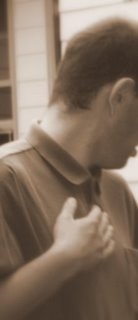 Retard
RetardIt's hard figuring out what to do with my son for his birthday, because he always expects a Very Big Deal. Which is fine, as long as I can think of something he's not already bored with. Baseball games are so when-he-was-a-teenager, movies are so what-he-can-do-by-himself. If I don't come up with an idea, he'll propose bowling or shopping at Best Buy or something else I really hate. So when a friend proposed a comedy club, I thought, "Sure! Big laughs!"
My son said fine.
But when I went to the comedy club's website and saw the picture and bio of the comedian, I panicked. He was head-shaved and angular and crouched in a karate move; he looked like an attack humorist. His bio said that his mentor had been Sam Kineson, he of the mean-spirited tirades. I imagined the guy bellowing "RE-tard" at some point in his act. Worse yet, I imagined him asking if anyone had any special occasions that night. I imagined that Matt would call out, "Here, sir!" and jump to his big awkward feet and that the comedian--already poised to make a fool of anyone who exposed himself, as comics like Letterman do with their hapless guests--would make painful use of this even greater opportunity for hilarity. As we drove to the comedy club, I was braced for combat. I whispered to my husband that I was going to have to rush the stage if the guy started to screw with Matt. My husband told me to warn him in time, so that he could move to the other side of the room.
I've written about my son-- my mildly/moderately retarded, kind of autistic son--at Salon and Brain-Child. If I'm describing him to other people, I think retarded is a tolerable word. It tells people something of who he is without a lot of polysyllabic subterfuge. I'd rather have them think the worst--and prepare themselves for compassion-- and then be astounded by all the things he is in addition to the label. But "retarded" is not really an accurate word. Matt doesn't seem slower than anyone else, only different. Sometimes I think that part of him is off in one of those 85 other dimensions that particle physicists keep talking about, and that things are both lost and gained in translation. Matt refers to himself as having "learning differences," which also doesn't seem right, in addition to having too many syllables. It might give someone the idea that he can only work out logarithms if they're projected sideways onto giant pieces of rye toast.
I don't use the word "retarded" in front of him.
Shortly after the show started, I knew the night was going to bomb. When Matt isn't enjoying himself, he acts like a beached whale-- he thrashes around in his seat and makes long whale-song sighs. He can clear out a row of movie seats when he's bored. Even though the first of the three comedians to take the stage was funny, Matt didn't even smile. He was as implacably grim as one of those Easter Island heads, even when the comedian referred to Cleveland's Public Square as the Homeless Octogon. I thought it was funny.
The second comedian was a baby-faced guy who was probably younger than Matt. He was my favorite kind of comedian, a Dennis Miller type who was so quick with his words and his wit that I could hardly keep up. His comedic specialty was identifying the things we're sensitive about--race, sexual politics, fatal illnesses--and taking a poke at them. Lots of comedians do this, but he was both appalling and very clever. I'd repeat the thing he said to the Pro-Life woman who asked him what if the Virgin Mary had opted to have an abortion, but it's his joke and too awful--if hilarious--for me to repeat in mixed company. I laughed and laughed--at the same time, wondering how I could laugh, since in any other circumstance what he was saying would only be cruel. I guess it's this: we erect a delicate ediface of words around the things that are painful and hard. When someone reaches out and crumples that edifice bit by bit--and not with a blunt instrument, but with smart, gleeful observations that reflect the futility of our efforts--it's funny. I guess we laugh at our own wincing. And we laugh at the audacity of someone who crashes through the edifice instead of carefully skirting it.
Toward the end of his act, when the laughter from the Virgin Mary joke hadn't yet died down, as people in the audience--still laughing-- were nonetheless loudly moaning that he could say such things--the comedian sequed into new territory. "I hate all the attention our society pays to famous athletes," he said, so earnestly. "Why, there's an international competition that we ignore all the time-- Special Olympics!"
Matt's attention--which had been on the noisy bachelorette party behind us--drifted back to the stage. He gave a gracious little wave to the comedian, as if he were a celebrity in the audience whose presence had been revealed--he has, after all, several Special Olympics gold medals languishing on his dresser. As the comedian went on to deliver a blisteringly graphic riff on the attributes of Special Olympics athletes--I recall something about big heads and drool cups--my husband and I froze. I couldn't bear to look at Matt. I didn't want to see comprehension replace boredom. The audience laughed and moaned, laughed and moaned, and then the comedian left the stage. I could breathe again. I finally looked at Matt, who was studying the dessert menu with a scowl. Just as he didn't find any of the other jokes interesting, he hadn't paid much attention to this material--only to the part that sounded like a salute to activities he has been a part of. Maybe I've trained him to expect the salutes and not the jibes? I don't know.
As we left, I said, "I'm sorry, sweetie-- I don't think you had much fun."
He gave me that Easter Island stare. "Sometimes, I don't laugh all night."

Saturday, August 05, 2006
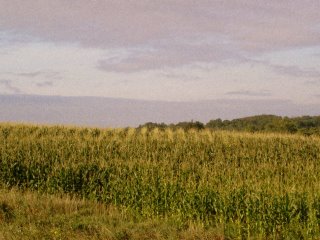 Menudo for Breakfast
Menudo for BreakfastI had to post this picture, even though it's not very good and has nothing to do with menudo. As I was driving along US-80, I had a lot of time to think about corn. Something magical about it-- think of Steven King's The Stand, that baseball movie (can't think of its name--if Kevin Costner built built it, they would come), Children of the Corn...I thought of more examples, but have forgotten. Anyway, corn is somehow mezmerizing, mysterious, mythical. Has this to do with our country's history-- the first gift to Europeans was supposed to have been maize, right? Or is it just that the fields of corn go on and on, covering the land, muffling the earth, hiding...what? We plant all that corn, then seem to be a little uneasy at what we hath wrought.
A few years ago, in another trip cross country, my daughter and I drove from Cleveland to Portland on probably the least direct route: we drove down to Nashville and then took Rte. 40 all the way to Arizona (I think that's where we left 40). The part of our trip that passed through Texas was miserable. A truck had flipped over, spilled fuel, and exploded. Fire spread along the sides of the road and median strip, but we were stuck there, held in place by traffic, not sure if we too were going to catch fire, not sure what had happened to the driver. We were finally able to move on and determined to get out of Texas, but we were too tired and had to spend the night in a horrible town that smelled of oil fire. So we got up early the next morning, got back on 40 and sped towards New Mexico.
Everything seemed to change after we crossed the state line. The landscape turned beautiful, and the sun rising behind us cast a shadow of our car on nearby mesas-- we looked so swift and airy! We were hungry, so we stopped at the first town. Tucumcari, I think. We wanted Mexican food and weren't sure we were going to find any at 7:00 in the morning, but a place called Raul's was open and we became the only customers. On the breakfast menu, there was a listing of the usual assortment--eggs and sausage and potatoes--but also this: "Menudo, Breakfast of Champions!" And even though menudo is a spicy tripe stew and not eggs, it was sort of something we had to do. The waiter came out and asked where we were from, then walked away shaking his head, muttering, "Two girls from Cleveland who want menudo for breakfast!"
Why mention this now? Well, I like thinking about it-- a great memory as well as great menudo--and I hoped something like this would happen on my recent trip. Not so. The food was uniformly bad along the road. I decided that towns should put out a sign listing all the local eateries as well as the big Mac type places for those of us who want to patronize local businesses. I also thought there should be travel books-- like the AAA guides-- that highlight local motels and restaurants, not just the chains.
I wouldn't mind that assignment!

Friday, August 04, 2006
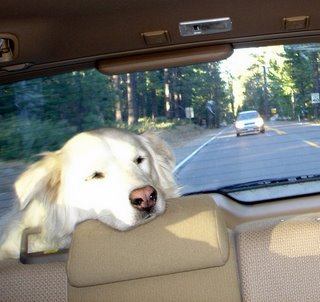 Lulu the Beloved
Lulu the BelovedThis was what I saw in my rearview mirror for 38 hours-- sometimes sleeping with her head on the back seat, sometimes just watching me with big woeful eyes.
Damn that Mapquest-- got lost in foggy Iowa for a while. All the while, I was listening to Gilead, which was read by a man with an annoyingly hearty voice. Despite the voice, I was weeping because the prose and the book overall are so beautiful. Gilead is set in Iowa; I listened as the characters were crossing the West Nishna-something river and suddenly remembered that I had crossed it the day before, wondering if the TMers had somehow won naming rights to it.
Back in Cleveland now. So much to do. These are the other great things about driving cross country: you can wear the same clothes for four days in a row and all you have to do is move forward.
Every time I stopped at a rest area or gas station, I did as Bird (the character in my under-revision novel) would do: I looked for arrowheads. Unlike her, I did not find any.

Wednesday, August 02, 2006

 Hogs Are On The High Side Today
Hogs Are On The High Side TodayWhat I love about driving across country is that you find out how the rest of the country isn't like you. Nowhere more than on the radio. The stations play a lot of the same music heard in Cleveland or San Francisco or whatever, but it's interspersed with earnest discussions of hog prices and bean futures. There was a report delivered so quickly that I couldn't quite follow, which sounded much like a stock report only not. "September lean hogs at 4 3/4, down two" and so on. Which made the landscape I was shooting through seem even more fascinating. In Iowa, one's thoughts are on corn-- that's what you see for miles and miles, spreading away from the road in evenly spaced rows that play that little pop-art game with your eye. Fabric metaphors come to mind. It's beautiful. I know from Michael Pollan's The Omnivore's Dilemma that I'm zenning out on what is actually a problem-- the mono-crop that's destroyed American farming--but still, beautiful.
I made a detour to look at Fairfield, Iowa, home of the Maharishi University of Management and Vedic City, the "world's first city to be designed and built according to the ancient Vedic science of architecture and city planning according to Natural Law." Hmmm-- I got a press release from the Trancendental Meditation (imagine the registered trademark sign here--it always follows) folks that hundreds of yogic flyers had come to town to initiate world peace. Disappointingly, they seem to have settled down.
Tuesday, August 01, 2006
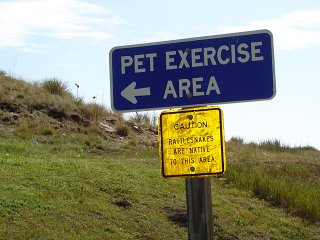 Little Oil Wells Everywhere
Little Oil Wells EverywhereThat title doesn't have anything to do with the picture. This was the sign at the first rest area in Nebraska ( small yellow sign says, alarmingly, "Caution, rattlesnakes are native to this area") But as I left the rest area, the only things moving in the surrounding fields were little oil derricks (sp?), dipping and bobbing like mechanical birds.
I don't know why Montana gets the Big Sky moniker. Wyoming has an awful lot of sky and Nebraska has even more-- there's hardly anything higher than a stalk of corn, nothing to interfere with all that sky. Which wouldn't be a bad thing, ordinarily. But as I was driving to my destination (York, Nebraska-- over 800 miles away from last night's lodging), there were all these ominous warnings on the radio about thunder storms with lightening close to the ground and ten-pound hail stones and such. As it got dark, the light show started. It was like being in Cleveland for the fourth of July-- you can see the big fireworks downtown plus all the little fireworks in the suburbs and in the scofflaws' front yards. So there was a huge display of lightening to my right and about four smaller displays, and they all seemed to repeat about every 20 seconds. As if the sky was pulsing. Sometimes the classic lightening bolt, sometimes one that branched upward like a giant candelabra, sometimes one that groped sideways, like a spectral hand. I couldn't hear the storm, so I assumed it was pretty far away ( just in case the lightening might hit closer, though, I didn't drive near any fuel trucks). But since the sky was so bare of mountains and trees-- so damn big-- it was pretty scary. Isn't there some sort of exhibit at science museums, a glass globe lights up with electrical currents when you put your hand on it? It was like being inside that globe.

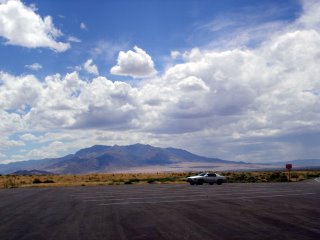 All Livestock Must Be Restrained
All Livestock Must Be RestrainedSo said the sign headed into this Nevada rest area, somewhere between Lovelock ("lock up your love" said the billboard) and Winnemucca. In the middle of day one of the four-day drive from California back to Ohio; landscape bliss. Nevada is a breathtaking state-- route 80 is like a long long corridor between mountains so beautiful and forboding they make you cry. Okay, they almost make me cry. There were several books that I read over and over when I was a kid, and a book of Best American Short stories was one of them. John Steinbeck's story, The Red Pony, was an absolute favorite. The red pony disappears (I recall) into the nearby mysterious landscape. Where I lived in Oroville, there was a road that turned away from our houses and dwindled away into the woods; I always thought that was the kind of place the red pony might have gone. Nevada is almost all like that, a place where red ponies disappear. There are those distant mountains, always, then up closer, miles of sagebrush that look like gray, scratchy chenille and suddenly lush areas with rivers or burned areas from the fire, like spilled black milk. Wish I could cut down one of the dirt roads and explore.
When in California, I went with some friends to the Donner Party museum and Alder Creek site. Thus the landscape had new meaning. At Elko, I stopped to get gas and saw some harsh/gorgeous mountains looming behind the town. They were the Ruby Mountains-- the Donner Party's first great misstep.
Listened all the way (uhhh ten hours) to Mark Salzman's True Notebooks, about his experience teaching creative writing to juvenile detention boys. Great book. It made me think a lot about the work I've done with women in prison. When I was listening to some of the first essays the boys wrote, my reaction was, "Hey, most of my women were never able to write anything like that!" One thought was that my women were much older-- had many more years to drink and take crack and get hit in the head by their boyfriends; they had more ill effects from the lifestyle. I was a little relieved when Salzman said later that there were some weeks when the boys only wrote about pussy and beer.
What I'd like to write about: maybe a nice little travel essay about how our reading influences what we see when we travel.

